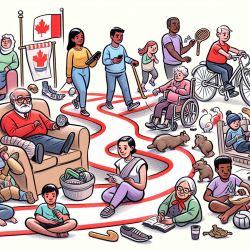Introduction
Physical inactivity is a pressing public health concern with far-reaching implications for both physical and mental health. Despite its significance, policy interventions to combat this issue have been limited. A recent study titled "Political Orientation and Public Attributions for the Causes and Solutions of Physical Inactivity in Canada: Implications for Policy Support" sheds light on how public perceptions and political orientations influence policy support. This blog explores these findings and offers insights for practitioners aiming to enhance their advocacy efforts.
Key Findings from the Study
The study analyzed data from 2,044 Canadian adults to understand how public attributions for the causes and solutions of physical inactivity, along with political orientation, affect support for policy actions. Here are the key takeaways:
- Individuals who attribute physical inactivity to internal causes (personal responsibility) show less support for policy actions compared to those who view it as an external or combined issue.
- Political orientation plays a significant role, with conservatives generally less supportive of policy actions than liberals or centrists.
- There is a notable interaction between political orientation and perceptions of responsibility for solving physical inactivity, affecting support for policy interventions.
Implications for Practitioners
Understanding these dynamics can help practitioners tailor their communication and advocacy strategies. Here are some actionable insights:
- Targeted Messaging: Develop messages that resonate with different political orientations. For conservatives, emphasize personal and economic benefits of policy interventions.
- Framing the Issue: Highlight external factors contributing to physical inactivity to garner broader support for policy actions.
- Building Consensus: Engage stakeholders across the political spectrum to foster a unified approach to addressing physical inactivity.
Encouraging Further Research
While the study provides valuable insights, further research is needed to explore effective communication strategies and interventions that can bridge the gap in policy support. Practitioners are encouraged to delve deeper into understanding the nuances of public opinion and political influences on health policy.
Conclusion
Addressing physical inactivity requires a multifaceted approach that considers public perceptions and political orientations. By leveraging the findings of this study, practitioners can enhance their advocacy efforts and contribute to the development of effective policies that promote physical activity. For those interested in exploring the original research, please follow this link: Political Orientation and Public Attributions for the Causes and Solutions of Physical Inactivity in Canada: Implications for Policy Support.










